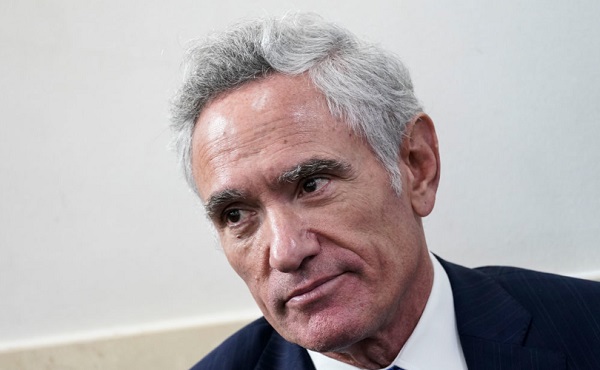Education
Aspiring Leaders program focuses on fostering effective relationships

Creating a welcoming, caring, respectful and safe learning environment by fostering effective relationships was the goal of the second Red Deer Public Schools’ Aspiring Leaders session.
Nearly 60 Red Deer Public staff including administrators, teachers and support staff attended the session on January 11.
Hosted by the Division’s Human Resources department, the session, titled ‘Fostering Effective Relationships’, allowed attendees to take part in an empathy mapping exercise. The exercise gave participants a leadership scenario in which they each had a role. After reviewing their scenario, which included a choice between a coworker or a classroom scenario, participants then reflected on the series of events from the scenario from the perspective of the role they were playing.
Associate Superintendent, Human Resources Corrine Thorsteinson shared that relationships are the foundation of good leadership and successful leaders rise to the occasion in the way they navigate through difficult or challenging conversations and situations. “There are two key leadership concepts upon which effective relationships are built: empathy and compassion. These two concepts work hand-in-hand to provide a lens for perspective taking and staying out of judgment,” she said. “The result is meaningful connections which help us work towards solutions.”

More Aspiring Leaders sessions will take place throughout the rest of the school year.
“We encourage staff, who haven’t already registered, to consider signing up for any of our sessions through the remainder of this school year,” said Corrine. “These sessions are a perfect opportunity for any Red Deer Public employee who wants to explore whether a formal leadership position is right for them; wants to build or enhance their leadership toolkit; wants to lead where they are at; or wants an opportunity to learn from and engage with other colleagues interested in leadership.”
2025 Federal Election
RCMP memo warns of Chinese interference on Canadian university campuses to affect election

From LifeSiteNews
The Royal Canadian Mounted Police singled out China as the only nation of interest, noting that the ‘threat posed by the People’s Republic and its powerful security and intelligence apparatus’ remains a ‘concern.’
An internal briefing note from Canada’s top police force warned that agents of the Communist Chinese Party (CCP) are targeting Canadian universities to intimidate them and in some instances challenge them on their “political positions.”
The December 3, 2024, memo titled On-Campus Foreign Interference from the Royal Canadian Mounted Police (RCMP) did not mention specific universities by name but noted that foreign interference was sophisticated and came solely from China.
The memo stated that as Canada’s academic institutions rely on “open, creative and collaborative environments” to foster independent debate, some “foreign intelligence services and government officials including the People’s Republic of China can exploit this culture of openness to monitor and coerce students, faculty and other university officials.”
“On university campuses foreign states may seek to exert undue influence, covertly and through proxies, by harassing dissidents and suppressing academic freedoms and free speech that are not aligned with their political interests,” the RCMP noted in the memo.
The memo noted that foreign agents’ influence in “public debate at academic institutions” may lead to them sponsoring “specific events to shape discussion rather than engage in free debate and dialogue.”
“They may also directly or indirectly attempt to disrupt public events or other on-campus activities they perceive as challenging their political positions and spread disinformation, undermining confidence in academic discourse and expertise,” the memo observed.
Notably, the memo singled out China, and thus the CCP, as the only nation of interest, noting that the “threat posed by the People’s Republic and its powerful security and intelligence apparatus including malign activities targeting our democratic institutions, communities and economic prosperity” remains a “concern.”
Some of the activities that foreign agents engaged included the recruitment of CCP sympathizers and “in some instances,” noted the memo, saw students be “pressured to participate in activities that are covertly organized by a foreign power.”
“Universities can also be used as venues for ‘talent spotting’ and intelligence collection in specific circumstances,” the memo stated.
The final report from the Foreign Interference Commission concluded that operatives from China may have had a hand in helping to elect a handful of MPs in both the 2019 and 2021 Canadian federal elections. It also concluded that China was the primary foreign interference threat to Canada.
According to hearings from a 2021 House of Commons Special Committee on Canada-China Relations, there were numerous documented incidents of CCP intimidation.
For example, a Tibetan Canadian, Chemi Lhamo, testified she got death threats after she ran for student council president at the University of Toronto’s Scarborough campus.
“There were comments saying the bullet that would go through me was made in China,” she said, noting that “Community members of the allied nations who are subjected to the Chinese Communist Party’s colonial violence are not alien to these tactics. We have witnessed China’s interference and influence not just in our university campuses but also in our communities.”
Earlier this week, LifeSiteNews reported that Canada’s Security and Intelligence Threats to Elections Task Force (SITE) confirmed the CCP government was behind an online “operation” on WeChat to paint Prime Minister Mark Carney in a positive light.
Canadians will head to the polls in a general election on April 28.
LifeSiteNews reported last week that the Liberal Party under Carney, has thus far seen no less than three MP candidates drop out of the election race over allegations of foreign interference.
LifeSiteNews recently reported how the Conservative Party sounded the alarm by sharing a 2016 video of Carney saying the Communist Chinese regime’s “perspective” on things is “one of its many strengths.”
As reported by LifeSiteNews, a new exposé by investigative journalist Sam Cooper claims there is compelling evidence that Carney and former Prime Minister Justin Trudeau are strongly influenced by an “elite network” of foreign actors, including those with ties to China and the World Economic Forum.
Education
Our Kids Are Struggling To Read. Phonics Is The Easy Fix

From the Frontier Centre for Public Policy
One Manitoba school division is proving phonics works
If students don’t learn how to read in school, not much else that happens there is going to matter.
This might be a harsh way of putting it, but it’s the truth. Being unable to read makes it nearly impossible to function in society. Reading is foundational to everything, even mathematics.
That’s why Canadians across the country should be paying attention to what’s happening in Manitoba’s Evergreen School Division. Located in the Interlake region, including communities like Gimli, Arborg and Winnipeg Beach, Evergreen has completely overhauled its approach to reading instruction—and the early results are promising.
Instead of continuing with costly and ineffective methods like Reading Recovery and balanced literacy, Evergreen has adopted a structured literacy approach, putting phonics back at the centre of reading instruction.
Direct and explicit phonics instruction teaches students how to sound out the letters in words. Rather than guessing words from pictures or context, children are taught to decode the language itself. It’s simple, evidence-based, and long overdue.
In just one year, Evergreen schools saw measurable gains. A research firm evaluating the program found that five per cent more kindergarten to Grade 6 students were reading at grade level than the previous year. For a single year of change, that’s a significant improvement.
This should not be surprising. The science behind phonics instruction has been clear for decades. In the 1960s, Dr. Jeanne Chall, director of the Harvard Reading Laboratory, conducted extensive research into reading methods and concluded that systematic phonics instruction produces the strongest results.
Today, this evidence-based method is often referred to as the “science of reading” because the evidence overwhelmingly supports its effectiveness. While debates continue in many areas of education, this one is largely settled. Students need to be explicitly taught how to read using phonics—and the earlier, the better.
Yet Evergreen stands nearly alone. Manitoba’s Department of Education does not mandate phonics in its public schools. In fact, it largely avoids taking a stance on the issue at all. This silence is a disservice to students—and it’s a missed opportunity for genuine reform.
At the recent Manitoba School Boards Association convention, Evergreen trustees succeeded in passing an emergency motion calling on the association to lobby education faculties to ensure that new teachers are trained in systematic phonics instruction. It’s a critical first step—and one that should be replicated in every province.
It’s a travesty that the most effective reading method isn’t even taught in many teacher education programs. If new teachers aren’t trained in phonics, they’ll struggle to teach their students how to read—and the cycle of failure will continue.
Imagine what could happen if every province implemented structured literacy from the start of Grade 1. Students would become strong readers earlier, be better equipped for all other subjects, and experience greater success throughout school. Early literacy is a foundation for lifelong learning.
Evergreen School Division deserves credit for following the evidence and prioritizing real results over educational trends. But it shouldn’t be alone in this.
If provinces across Canada want to raise literacy rates and give every child a fair shot at academic success, they need to follow Evergreen’s lead—and they need to do it now.
All students deserve to learn how to read.
Michael Zwaagstra is a public high school teacher and a senior fellow at the Frontier Centre for Public Policy.
-

 Also Interesting22 hours ago
Also Interesting22 hours agoMortgage Mayhem: How Rising Interest Rates Are Squeezing Alberta Homeowners
-

 2025 Federal Election2 days ago
2025 Federal Election2 days agoMark Carney’s radical left-wing, globalist record proves he is Justin Trudeau 2.0
-

 2025 Federal Election1 day ago
2025 Federal Election1 day agoConservative Party urges investigation into Carney plan to spend $1 billion on heat pumps
-

 2025 Federal Election2 days ago
2025 Federal Election2 days agoDon’t double-down on net zero again
-

 COVID-191 day ago
COVID-191 day agoMassive new study links COVID jabs to higher risk of myocarditis, stroke, artery disease
-

 Alberta1 day ago
Alberta1 day agoAlberta’s embrace of activity-based funding is great news for patients
-

 2025 Federal Election1 day ago
2025 Federal Election1 day agoCommunist China helped boost Mark Carney’s image on social media, election watchdog reports
-

 Censorship Industrial Complex2 days ago
Censorship Industrial Complex2 days agoScott Atlas: COVID lockdowns, censorship have left a ‘permanent black mark on America’





